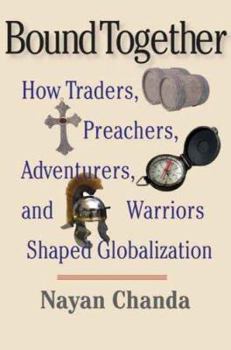Bound Together: How Traders, Preachers, Adventurers, and Warriors Shaped Globalization
Select Format
Select Condition 
Book Overview
A wide-ranging and original history of globalization, examining how it has developed and what it means for the future Since humans migrated from Africa and dispersed throughout the world, they have... This description may be from another edition of this product.
Format:Hardcover
Language:English
ISBN:0300112017
ISBN13:9780300112016
Release Date:May 2007
Publisher:Yale University Press
Length:391 Pages
Weight:1.00 lbs.
Dimensions:1.3" x 6.5" x 9.4"
Related Subjects
Accounting & Finance Business Business & Investing Civilization & Culture Criticism & Theory Economics Education & Reference Evolution Globalization History History & Criticism International Political Science Politics & Government Politics & Social Sciences Popular Economics Science & Math Social Sciences WorldCustomer Reviews
5 ratings
Bound Together is enthralling.
Published by Thriftbooks.com User , 16 years ago
The chapters are succinct and the author has a global, over-reaching perspective that captivates the reader. I looked forward to reading it every night for a week. Bound Together surpassed my expectations. I initially ordered it along with three other books on similar topics about capitalism and globalization. I read the others first because I thought they would be better. However, Bound Together was the best of the bunch.
Crossing Borders Since the Dawn of History
Published by Thriftbooks.com User , 16 years ago
The central thesis of this book is that crossing borders - or what is now called globalization - is actually nothing new, it has been going on since the first humans left their African homeland at the beginning of time. The difference between now and then is that new technologies have expanded the volume, speed and content of border crossings. Nayan Chanda has given us a sweeping overview of the history of globalization from the perspective of traders, preachers, adventurers, and warriors. Chanda's approach is descriptive rather than prescriptive. He is well aware of the current debate on who globalization actually benefits. On the one hand, globalization has benefited millions in the developing world who now at least have low wages as opposed to no wages at all. Cheerleaders will tell you the rising tide lifts all boats. Critics, on the other hand, charge that it is responsible for many of the world's problems such as global warming, the rise in commodity prices, child labor, and American imperialism. There is certainly some truth in these charges. Chanda recognizes the debate but tries to stay above it. He argues that it is pointless to fight globalization because it has always been with us and it is here to stay. Besides that, no single entity controls it, so it would require the efforts of many to manage it. Chanda's story begins with an analysis of his own DNA a few years ago. That test showed that he was descended from an African father more than 36,000 years ago. His ancestors were part of a group that represented some of the earliest migrations into India. Aside from international ancestry, Chanda epitomizes the 21st century cosmopolitan, having lived in Calcutta, Paris, Hong Kong, and now New Haven, he has written many scholarly articles for a number of international publications. Traders, preachers, adventures, and warriors have always been agents of globalization. From Marco Polo on the Silk Route to the journey of the iPod from Shanghai to Chandra's home in New Haven, people and corporations will forever be crossing borders in search of profits. In the section on preachers, Chanda makes some interesting points about NGOs - such as Human Rights Watch. NGOs have taken up the role of missionaries from earlier centuries. Though non-religious, HRW has been active in places like Darfur preaching universal values. This, in my view, is admirable, for one shouldn't shy about claiming moral superiority to the killing that takes place there. NGO workers would probably object to being called preachers, but they shouldn't. Adventurers and Warriors played a large role in border crossings in the past, but less so today, since the world is getting smaller and more user-friendly, due to the advances of technology. Although Chanda believes globalization is inevitable, he is no neoliberal freemarketer who believes in the infallible benevolence of multinationals. He believes globalization should be managed through collaboration o
Fascinating Story, Full of things American's Don't Know
Published by Thriftbooks.com User , 16 years ago
What made this book fascinating is that it's told entirely from a non-Western point of view, yet it ties in perfectly with current events. We Americans get bound up in our view of history, which is primarily Europe's, but as Chanda so wonderfully tells the story, much happened of which the Europeans were not aware. I highly recommend this book as an essential primer for those not familiar with the global history of globalization.
Nayan Chanda reinforces his stellar reputation
Published by Thriftbooks.com User , 16 years ago
"Brother Enemy" was always considered by scholars and laypeople alike as the defining work on the war in Cambodia, and Nayan Chanda's reporting was simply brilliant. I predict that "Bound Together" will similarly be regarded as a defining work -- this time on globalization. It's a marvelous read, and the book reinforces Chanda's reputation as a careful reporter and first-rate story teller.
Readable, smart, and original
Published by Thriftbooks.com User , 17 years ago
Nayan Chanda is a great storyteller as well as a journalist and scholar. This is a book to finish in a weekend or take on vacation--you can skim or savor. If you are a reader, you will love it, even if your knowledge or interest in this area is limited (as is mine). The editorial reviews agree that the book is sophisticated, so you can trust that the research and conclusions will serve you well in any discussion you may have about globalization, human history, or the future of our world. I plan to give this as a graduation gift to several young friends--




